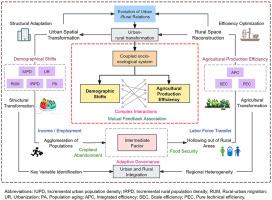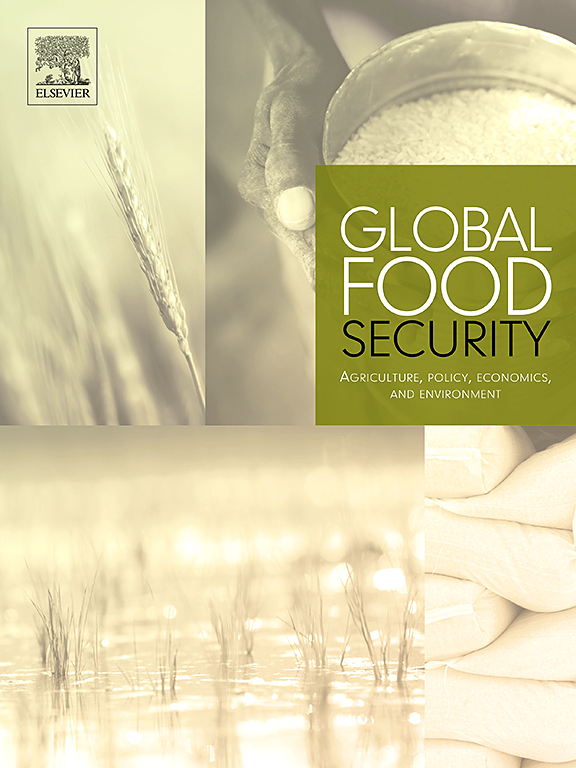Demographic shifts and agricultural production efficiency in the context of urban-rural transformation: Complex networks and geographic differences
IF 9.6
1区 经济学
Q1 FOOD SCIENCE & TECHNOLOGY
Global Food Security-Agriculture Policy Economics and Environment
Pub Date : 2025-06-01
DOI:10.1016/j.gfs.2025.100867
引用次数: 0
Abstract
Demographic shifts (DS) within urban-rural transformations have extensively impacted the socio-ecological systems of developing countries, particularly affecting agricultural production efficiency (AP). Concerns over food security and agricultural decline have sparked widespread criticism of these transformations. However, the complex networks between DS and AP remain poorly understood. This study establishes association networks between DS and AP within urban-rural contexts, capturing geographic differences and interactions in Southwest China. AP is calculated using super-efficiency DEA and Bayesian network models estimate the complex associations between DS and AP. The results indicate that rapid aging and large-scale urban-rural migration are the primary DS trends in Southwest China. AP initially declined and then rose, with minor changes in scale efficiency. Bayesian networks confirmed the complex networks between DS and AP, showing that urban-rural migration and population aging are highly correlated with changes in scale and technical efficiency. From 2010 to 2020, urban-rural migration significantly enhanced the positive coupling between DS and AP, suggesting that DS has promoted AP development on a integral scale. However, the DS-AP association networks exhibit geographic differences across various topographical regions. In mountainous areas, population aging, and rural exodus have inhibited AP development, warranting extensive attention. This study's framework aims to achieve sustainable socio-ecological development through the benign coupling of DS-AP systems, supporting urban-rural governance and the sustainable development goals by refining the feedback and interaction processes of coupled social-ecological systems.

城乡转型背景下的人口转移与农业生产效率:复杂网络与地域差异
城乡转型中的人口变化对发展中国家的社会生态系统产生了广泛的影响,特别是对农业生产效率的影响。对粮食安全和农业衰退的担忧引发了对这些转变的广泛批评。然而,DS和AP之间的复杂网络仍然知之甚少。本研究在城乡背景下建立了DS和AP之间的关联网络,捕捉了西南地区的地理差异和相互作用。结果表明,快速老龄化和大规模城乡人口迁移是西南地区人口发展的主要趋势。AP先下降后上升,规模效率变化不大。贝叶斯网络证实了城乡迁移和人口老龄化之间的复杂网络关系,表明城乡迁移和人口老龄化与规模和技术效率的变化高度相关。2010 - 2020年,城乡迁移显著增强了农村发展与农村发展的正耦合关系,说明农村发展在整体上促进了农村发展。然而,DS-AP关联网络在不同的地形区域表现出地理差异。在山区,人口老龄化和农村人口外流抑制了AP的发展,值得广泛关注。本研究的框架旨在通过DS-AP系统的良性耦合实现可持续的社会生态发展,通过细化耦合的社会生态系统的反馈和互动过程,支持城乡治理和可持续发展目标。
本文章由计算机程序翻译,如有差异,请以英文原文为准。
求助全文
约1分钟内获得全文
求助全文
来源期刊

Global Food Security-Agriculture Policy Economics and Environment
FOOD SCIENCE & TECHNOLOGY-
CiteScore
20.90
自引率
3.40%
发文量
69
期刊介绍:
Global Food Security plays a vital role in addressing food security challenges from local to global levels. To secure food systems, it emphasizes multifaceted actions considering technological, biophysical, institutional, economic, social, and political factors. The goal is to foster food systems that meet nutritional needs, preserve the environment, support livelihoods, tackle climate change, and diminish inequalities. This journal serves as a platform for researchers, policymakers, and practitioners to access and engage with recent, diverse research and perspectives on achieving sustainable food security globally. It aspires to be an internationally recognized resource presenting cutting-edge insights in an accessible manner to a broad audience.
 求助内容:
求助内容: 应助结果提醒方式:
应助结果提醒方式:


